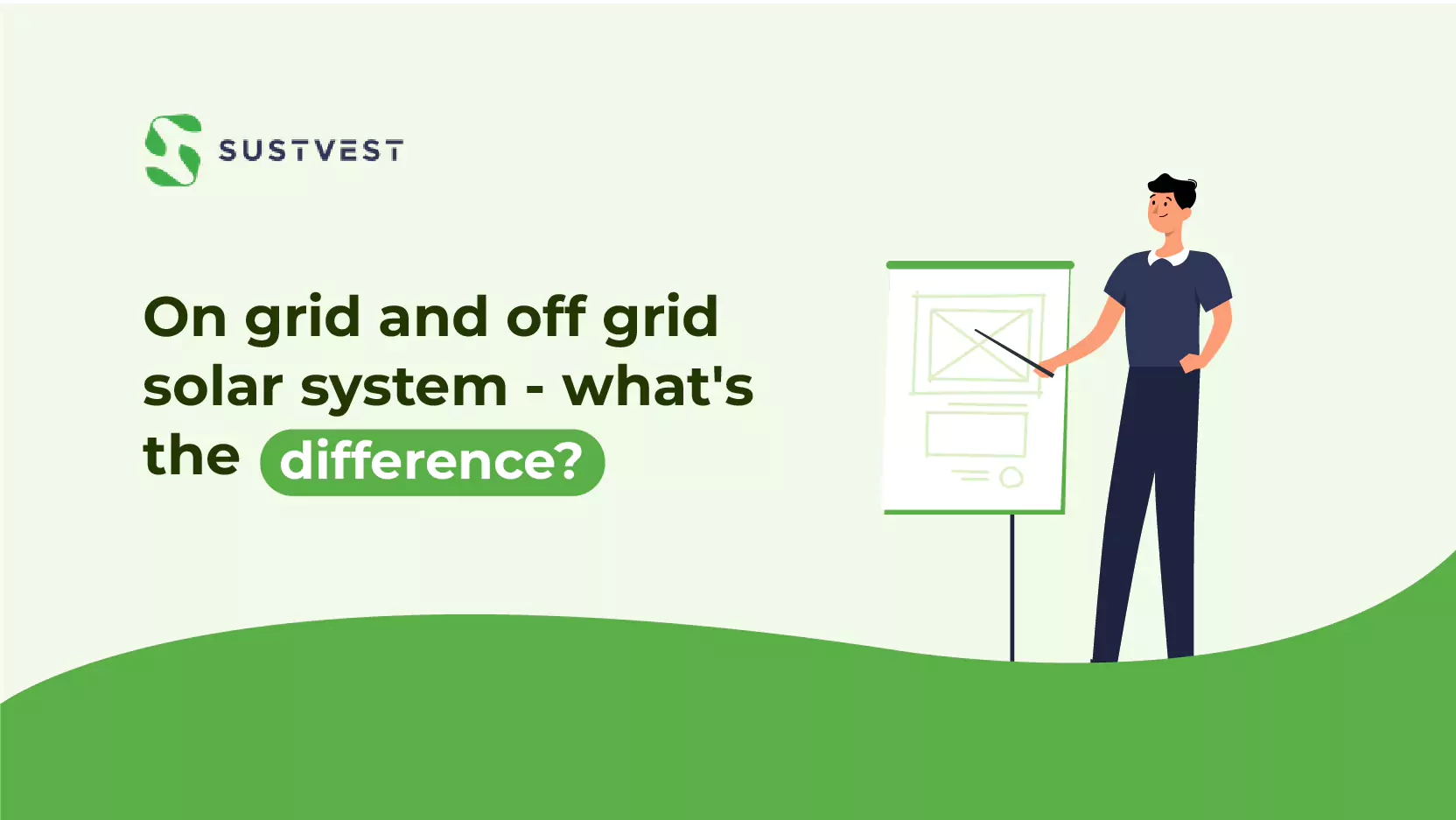Are you thinking of taking the plunge towards renewable energy? Installing a solar system is no joke; in fact, it is a significant decision. When you are investing in green energy, you have to make the right choices in getting a piece of equipment that lasts.
In addition to reducing your carbon footprint, the right solar system will help lower your energy costs. But choosing one that matches your needs is not an easy feat. Fret not, we have got you covered. In this blog, we’ll delve into the differences between on-grid and off-grid solar systems and help you determine which one is better for you.
Let’s begin by understanding an on-grid and off-grid solar system one by one.

What is an On-Grid Solar System?
An on-grid solar system is connected directly to the electrical grid. The solar panels generate electricity from sunlight and feed the power directly into the local utility grid. The main components of an on-grid system are listed below:
1. Solar Panels
The photovoltaic panels are installed on the rooftops and other suitable locations to capture the sun’s rays and convert them into electricity.
2. Inverter
An inverter is a common feature of both on-grid and off-grid solar systems. It converts the electricity generated by the panels into alternating current(AC), which is the type of current used in homes and industries.
3. Grid Connection
The main difference between an on-grid and off-grid solar system lies in the grid. Excess electricity can be sent as a backup to the grid when the solar system generates excess energy that is required on-site.
4. Net Meter
You will always find a net meter installed in on-grid systems. The meter tracks the total electricity consumption of a household and credits the excess amount to the homeowner’s utility bill.
An on-grid solar system is reliable as the stored electricity can feed power when the panels are not producing any energy. This happens at night and on cloudy days. House owners can even offset their consumption and earn credits for the backup power sent to the grid.
Now, let’s delve into the details of an off-grid solar system and what it entails.
What is Off-Grid Solar System?
The key difference between an on-grid and off-grid solar system is that an off-grid system does not have an electrical grid. It is a stand-alone system that’s designed to generate and store all the energy needed to meet the demands of households, businesses, and power stations. The key features of the system are:
1. Solar Panels
Similar to on-grid system, off-grid systems have solar panels to capture the sun’s radiation and produce electricity.
2. Charge Controller
It regulates the flow of electricity from the PV panels to the battery bank. The controller prevents overcharging and allows the batteries to be charged efficiently.
3. Battery Bank
An off-grid system has an array of lead-acid or lithium-ion batteries to store the excess electricity for use during the night or on cloudy days.
4. Backup Generator
Some off-grid systems have an additional backup generator to provide power when solar generation is insufficient due to extended periods of bad weather.
Off-grid systems are usually used in remote locations where grid connections are difficult or expensive to install.
With the basics clarified, let’s understand the key differences between an on-grid and off-grid solar system.
On-Grid Vs. Off-Grid Solar System: A Detailed Comparison
Here are the key differences between an on-grid and off-grid solar system:
| Criteria | On-Grid Solar System | Off-Grid Solar System |
| Grid connection | Connected to the grid | Not connected to the grid |
| Energy dependence | Relies on the grid for backup during power outages | Operates independently |
| Battery Storage | Minimal to no batteries required | A bank of batteries is required for storing excess electricity |
| Backup power | The grid serves as a backup during outages | Can include a backup generator |
| Operating cost | Lower cost with greater power savings | Expensive due to battery storage |
| Grid stability | Stable power supply but can be affected due to grid outage | Self-reliant and not influenced by grid outages |
| Excess Electricity | Excess electricity can be sold back to the grid(net metering) | Excess energy is stored in batteries and wasted if not used |
| Suitability | Ideal for urban areas with reliable grid connection | Ideal for remote locations with unreliable grid access |
| Energy Management | Less control over consumption and storage | Complete control |
| Environmental Impact | Reduces emissions | It also reduces carbon emissions |
| Maintenance | Low maintenance as only solar panels need regular upkeep | Requires regular maintenance of batteries and other components |
| Example Use Cases | Residential and commercial areas with stable grid connection | Remote cabins, rural areas, and places with unreliable grid access |
While an on-grid and off-grid solar system both have their own features and benefits, there are a few factors to consider before investing in a power system.
Let’s quickly check out a few factors before you purchase a solar system.
Which Solar System is the Right Choice for You?
Are you confused about on-grid and off-grid solar systems? The decision depends on factors like your location, budget, environment, and energy consumption patterns. Here is a complete guide to help you make the right choice:
1. Assess Your Energy Consumption
Review your past electricity bills. It’s important to calculate your average energy consumption in kilowatt-hours (KWH). Decide whether you want to offset your energy consumption or not.
2. Location
- On-Grid – If you are living in an urban location with good grid access and net metering, an on-grid system may be a better choice. You can even sell excess electricity back to the grid and earn credits.
- Off-Grid – If you live in a remote area with poor grid access and frequent power outages, then off-grid is better suited for you.
3. Budget and Financial Aspect
- On-Grid – It is cheaper as no additional investment in batteries is required. Plus, you get additional benefits like tax exemptions, rebates, and incentives.
- Off-Grid – Huge upfront costs due to complex systems but long-term savings in utility bills.
4. Maintenance and System Longevity
- On-Grid – These systems require less maintenance as the demand can be supplemented by the grid and the solar panels have a long lifespan.
- Off-Grid – Off-grid systems require extensive maintenance, and the battery needs to be replaced at regular intervals.
5. Backup Power Needs
Is uninterrupted power an absolute necessity for your lifestyle and business? Then invest in off-grid systems that are capable of handling extended power outages because on-grid solar systems cannot function if the grid goes down.
6. Consult with Professionals
It’s best to consult solar energy experts, as they will give personalized recommendations tailored to your situation, location, and financial needs.
Ultimately, the decision to choose between an on-grid and off-grid solar system depends on your specific needs. It should align with your budget, location, and energy needs. Carefully weigh your options and conduct a thorough analysis before investing in a single system.
Now, let’s move on to frequently asked questions about on grid and off grid solar systems.
FAQs – On-Grid and Off-Grid Solar System
Why choose the off-grid solar system?
Power outages are really common and cause great inconvenience. They are unpredictable and hamper day-to-day activities. An off-grid system doesn’t depend on any grid, thereby providing an uninterrupted power supply.
What is the disadvantage of on-grid?
On-grid systems do not provide power during blackouts or extended power outages. If the grid is damaged, then no solar energy can be produced. These are some of the disadvantages of an on-grid system.
What are the two advantages of a grid system?
There are many advantages to a modern grid electrical system. However, the two main benefits are as follows:
- Reduction in energy losses, congestion, and efficient power generation.
- Reliable and improving power quality with enhanced customer benefits.
What is meant by grid?
A grid-connected solar system is a power generator that is connected to a utility grid. The energy generated is transmitted via the grid to run various home appliances. It’s easy to install, with no complex systems involved.
Can an on-grid and off-grid solar system work without a battery?
Yes, they can work without batteries. However, this works when you have a hybrid inverter that converts AC current into solar energy and there is sufficient sunlight.
Conclusion
To sum it up, the distinction between an on-grid and off-grid solar system lies in their own features. While both are extensively used to generate electricity, the choice remains yours as to which power system suits you best. Always ensure that the solar panels are high-quality.
Are you curious about the green energy landscape in India? Check out Sustvest for detailed renewable energy investments and more.

Founder of Sustvest
Hardik completed his B.Tech from BITS Pilani. Keeping the current global scenario, the growth of renewable energy in mind, and people looking for investment opportunities in mind he founded SustVest ( formerly, Solar Grid X ) in 2018. This venture led him to achieve the ‘Emerging Fintech Talent of the Year in MENA region ‘ in October 2019.




